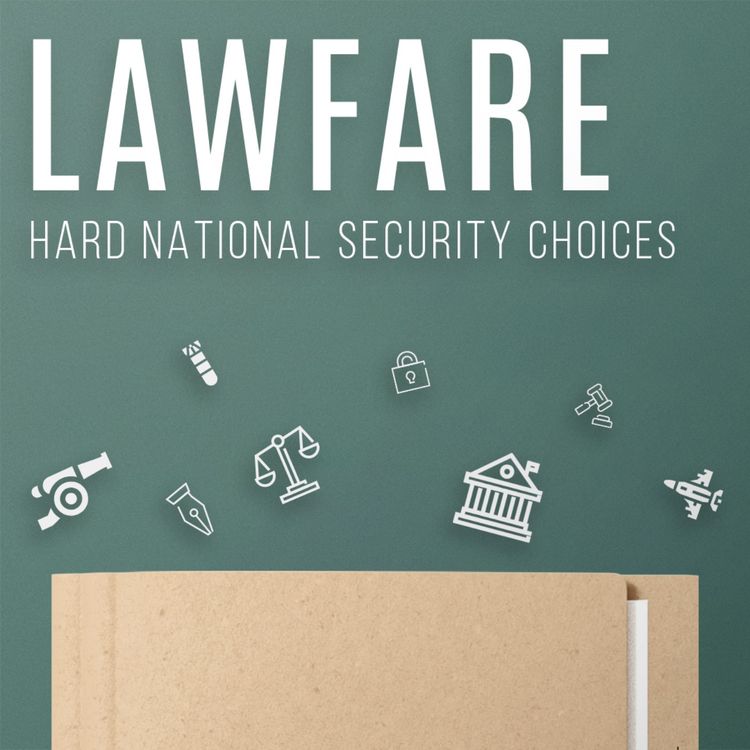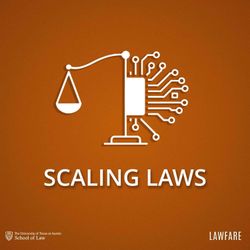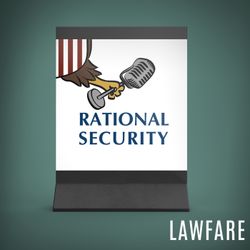Share

The Lawfare Podcast: Patreon Edition
Rational Security: The “So Much for that Menendez Rest Stop” Edition
•
This week on Rational Security, Alan, Quinta, and Scott reunited to discuss the week’s big national security news, including:
- “Do as I Menendsez, Not as I Menendo.” New Jersey Senator and, until recently, chairman of the Senate foreign relations committee Bob Menendez was indicted alongside his wife last week, on charges that they accepted money from Egyptian businessmen in exchange for information and favors arising from Menendez’s official duties. How serious are these charges? Where will they lead?
- “…with a Silver Spoon.” D.C. federal district court judge Tanya Chutkan is weighing a gag order on former President Trump, aimed at restraining him from commenting on the proceedings or attacking various officials involved in them. Trump and his attorneys, meanwhile, see the gag order request as an attack on his First Amendment rights. Who is likely to prevail? And what are the broader stakes?
- “The Forever Chore.” The House foreign affairs committee is set to hold the latest in a long series of hearings on a topic that has been on Congress’s agenda for more than a decade: reforming the 2001 AUMF that provides the legal basis for most global counterterrorism operations. But despite near-universal agreement on the need for change, progress has been limited. Is there reason to think this time will be different?
For object lessons, Alan recommended the Dear Committee Trilogy, which even non-academics will find hilarious. Quinta urged listeners to check out the recent New York court decision concluding that former President Trump and his businesses misrepresented the value of various properties. And Scott log-rolled for his new law review article digging into some of the tricky constitutional issues raised by the prospect of defending Taiwan.
More episodes
View all episodes

Lawfare Daily: The Trials of the Trump Administration, Jan. 16
01:35:16|In a live conversation on YouTube, Lawfare Editor in Chief Benjamin Wittes sat down with Lawfare Senior Editors Anna Bower, Roger Parloff, Michael Feinberg and Molly Roberts to discuss the investigation of Federal Reserve chair Jerome Powell, Senator Mark Kelly’s suit against the Department of Defense, Illinois and Minnesota’s lawsuits against the Department of Homeland Security over an increase in deployment of federal immigration enforcement agents, and more.You can find information on legal challenges to Trump administration actions here. And check out Lawfare’s new homepage on the litigation, new Bluesky account, and new WITOAD merch.To receive ad-free podcasts, become a Lawfare Material Supporter at www.patreon.com/lawfare.
Lawfare Archive: Content Moderation Comes for Parler and Gettr
57:24|From September 9, 2021: Let’s say you’re a freedom-loving American fed up with Big Tech’s effort to censor your posts. Where can you take your business? One option is Parler—the social media platform that became notorious for its use by the Capitol rioters. Another is Gettr—a new site started by former Trump aide Jason Miller.Unfortunately, both platforms have problems. They don’t work very well. They might leak your personal data. They’re full of spam. And they seem less than concerned about hosting some of the internet’s worst illegal content. Can it be that some content moderation is necessary after all?Today, we’re bringing you another episode of our Arbiters of Truth series on the online information ecosystem. Evelyn Douek and Quinta Jurecic spoke with David Thiel, the big data architect and chief technical officer of the Stanford Internet Observatory. With his colleagues at Stanford, David has put together reports on the inner workings of both Parler and Gettr. They talked about how these websites work (and don’t), the strange contours of what both platforms are and aren’t willing to moderate, and what we should expect from the odd world of “alt-tech.”
Lawfare Archive: The Trump Administration’s Latest Moves to Dismantle the Iran Nuclear Agreement with Peter Harrell and Richard Nephew
37:07|From June 8, 2020: On May 27, the Trump administration announced that it was withdrawing sanctions waivers that had allowed Russian, Chinese and European companies to work with Iran on sensitive Iranian nuclear sites in support of the goals of the 2015 Iran nuclear agreement. Margaret Taylor talked about what it really means with two experts: Peter Harrell, an attorney and adjunct senior fellow at the Center for a New American Security, and Richard Nephew, senior research scholar at the Center on Global Energy Policy at Columbia University. They talked about what has happened since the Trump Administration decided to withdraw from the Iran nuclear agreement in 2018 and what difficulties a new presidential administration may encounter in re-joining the agreement.
Scaling Laws: How AI Can Transform Local Criminal Justice, with Francis Shen
52:51|Alan Rozenshtein, research director at Lawfare, spoke with Francis Shen, Professor of Law at the University of Minnesota, director of the Shen Neurolaw Lab, and candidate for Hennepin County Attorney.The conversation covered the intersection of neuroscience, AI, and criminal justice; how AI tools can improve criminal investigations and clearance rates; the role of AI in adjudication and plea negotiations; precision sentencing and individualized justice; the ethical concerns around AI bias, fairness, and surveillance; the practical challenges of implementing AI systems in local government; building institutional capacity and public trust; and the future of the prosecutor's office in an AI-augmented justice system.Find Scaling Laws on the Lawfare website, and subscribe to never miss an episode.
Rational Security: The “Scare Them When They’re Young” Edition
01:17:22|This week, Scott sat down with his Lawfare colleagues Tyler McBrien, Michael Feinberg, and Ariane Tabatabai to talk through the week’s big news in national security, including:“Between Iraq and a Hard Place.” Iran is engaged in perhaps its most serious bout of domestic unrest in a decade, spurred on by a failing economy and the seeming political weakness of the regime after its devastating military conflict with Israel and the United States this past summer. But the regime has struck back viciously, cutting off global media and communications access even as it has engaged in a vicious and violent campaign of repression that may have already led to as many as between 2,000 and 12,000 fatalities. That has led, among other things, to threats from the Trump administration that it may intervene militarily against the regime. What should we be making of this development? What does it mean for the future of Iran, and what role might the United States play in that future?“A Slippery Slope.” ICE’s increasingly provocative immigration enforcement actions came to a violent head last week in Minneapolis, when ICE agent Jonathan Ross shot and killed driver and possible protest participant Renee Good. While the White House has sought to frame Good as a “domestic terrorist” who threatened Ross, videos of the incident instead suggest that her conduct came nowhere close to the standard normally required for the use of lethal force. The FBI is now reportedly investigating Good’s widow for ties to activist groups, an effort that led several career federal prosecutors to quit this week. How effective are the administration’s attempts to shape the truth likely to prove? “Green with Envy.” Diplomatic representatives from Denmark and Greenland are meeting with senior administration officials as we record to discuss a way forward on Greenland, the self-governing and all-but-independent Danish territory that President Trump has openly coveted since returning to office, up to and including the threat of military force to acquire it. How serious should the world take these threats? Where is the competition over Greenland likely to lead?In object lessons, Tyler is setting the mood with a recommendation of Way Dynamic’s album “Massive Shoe.” Mike is boosting our moods with a preview of “One Movie After Another,” a retrospective of Paul Thomas Anderson films, coming soon to the AFI Silver Theatre in Silver Spring. Scott is setting some mood lighting with his Xenomorph-like bedtime reading light from Glocusent. And Ari is getting moody with a revisit of Pedro Almodóvar’s “Pain and Glory.”
Lawfare Daily: Entrepreneurial Federalism and the New National Security, with Ashley Deeks and Kristen Eichensehr
42:36|On today's episode, Lawfare Senior Editor Scott R. Anderson sits down with Lawfare Contributing Editor Professor Ashley Deeks of the University of Virginia School of Law and Professor Kristen Eichensehr of Harvard Law School to discuss their recent article entitled, "Federalism and the New National Security," recently published in the Harvard Law Review.Together, they discuss the new ways that states are engaging in national security policy (which Deeks and Eichensehr call "entrepreneurial federalism"), the costs and benefits of such practices, and strategies for how the states and the various branches of the federal government should engage with them.
Lawfare Daily: The U.S. Foreign Service at a ‘Breaking Point,’ with John Dinkelman
28:47|On today’s episode, Lawfare Managing Editor Tyler McBrien sits down with John Dinkelman, president of the American Foreign Service Association (AFSA), to discuss his organization’s latest report, entitled, “At the Breaking Point: The State of the U.S. Foreign Service in 2025.” They talk about why AFSA undertook such a project after the federal government workforce survey was canceled earlier in the year, the report’s major findings, and why a robust foreign service is vital to U.S. national security.
Lawfare Daily: The Latest in Iran, with Richard Nephew
53:40|Iran is once again witnessing large-scale protests, on which the regime is cracking down through mass arrests and deadly force. President Trump has stated that the United States would come to the rescue of Iranians if the regime continues to kill protestors. Meanwhile, Tehran continues to reconstitute its nuclear program, which was damaged during the 12-day war over the summer. President Trump has threatened to eliminate Iran’s nuclear and missile programs if Tehran does not stop rebuilding its capabilities. Iran’s regional standing remains diminished, though its relationships with Russia and China continue even as tensions create limits to cooperation. On today’s episode, Lawfare Public Service Fellow Ariane Tabatabai sits down with Richard Nephew, Senior Research Scholar at the Center on Global Energy Policy at Columbia University and former Deputy Special Envoy for Iran, to discuss the latest developments in Iran, take stock of U.S. policy toward Iran during President Trump’s first year back in office, and offer indicators for what to expect next.
Lawfare Daily: The Trials of the Trump Administration, Jan. 5
01:40:30|In a live conversation on YouTube, Lawfare Editor in Chief Benjamin Wittes sat down with Lawfare Senior Editors Roger Parloff Michael Feinberg and Eric Columbus to discuss the shooting by an ICE agent in Minnesota, what the Maduro indictment means for the Alien Enemies Act cases, the disqualification of the U.S. attorney for the Northern District of New York, and moreYou can find information on legal challenges to Trump administration actions here. And check out Lawfare’s new homepage on the litigation, new Bluesky account, and new WITOAD merch.To receive ad-free podcasts, become a Lawfare Material Supporter at www.patreon.com/lawfare. You can also support Lawfare by making a one-time donation at https://givebutter.com/lawfare-institute.